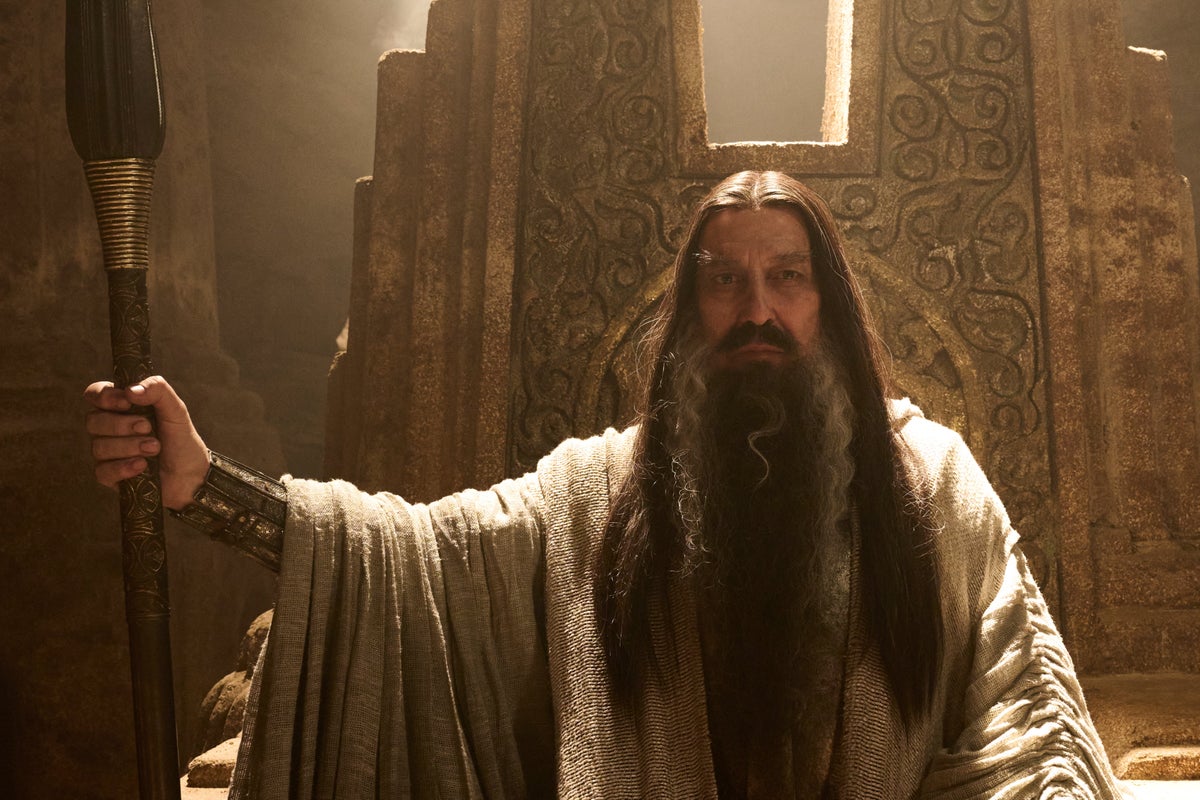
Support truly
independent journalism
Our mission is to deliver unbiased, fact-based reporting that holds power to account and exposes the truth.
Whether $5 or $50, every contribution counts.
Support us to deliver journalism without an agenda.

Louise Thomas
Editor
“All Middle-earth balances on the brink of the abyss,” whispers the Dark Lord Sauron, ominously. And so it proves, in this second season of Prime Video’s The Lord of the Rings: The Rings of Power. Fragile truces will break, new alliances will be brokered – and in the fires of the great furnace, 16 more rings will be forged. This is JRR Tolkien’s fantastical vision rendered on a big scale, for the small screen.
At Rivendell, the elves are in crisis. Last season, Galadriel (Morfydd Clark) is still reeling from the discovery that she was in cahoots – and almost in love – with Sauron (Charlie Vickers), who had disguised himself as a harmless mortal. Now, Sauron is off to forge his own ring – leaving Galadriel and estranged bestie Elrond (Robert Aramayo) to bicker about the use of the three sparkling elvish rings. Meanwhile, the strange wizard who may or may not be Gandalf (Daniel Weyman) is marching through the deadlands of Rhûn with his harfoot companions, Pharazôn (Trystan Gravelle) is once again angling for power in Númenor, and Isildur (Mr Bean’s Holiday’s Maxim Baldry) is forging his own path across Middle-earth. That’s not to mention all the other characters – with word-count destroyingly long names – who are off on their own adventures.
“Sauron sees himself not as master of a barren waste,” comes Galadriel’s judgement of her ex. “But of all Middle-earth.” And so the tease that began in the first season of Rings of Power comes into full force: rings are made, armies are sought, power is gained. Unlike its release schedule sibling, House of the Dragon, there can be no accusations of delayed gratification. The greatest hits of the Tolkien saga – from balrogs to palantirs – get wheeled out. Clark – the most convincing performer in this new interpretation of the mythology – is only a side player this season, as the action jumps from Khazad-dûm to Lindon, by way of the fires of Mordor. And adding to the sense of grandeur, several familiar faces from British stage and screen – Ciarán Hinds, Rory Kinnear, Jack Lowden – are added to the ensemble.
But even they struggle with the material. Delivering ominous dialogue about shadows descending across various kingdoms, or even just making old-timey small talk, requires a level of belief in the project. Merely reading the lines – however competent the delivery – results in something that feels like a high-octane table read. You must be willing to inhabit your character: “I am a displaced Middle-earther on the hunt for orcs.” And too often in Rings of Power, the desire to spend the lavish budget on sets and effects has resulted in casting decisions that undermine this principle. These are young, beautiful actors who look like they should be sipping coffee on a squishy sofa in a Dunelm catalogue, rather than smeared with mud and blood, traipsing across a lawless wilderness.
But Rings of Power has always struggled with creating an internal verisimilitude. When Arondir (Ismael Cruz Córdova) returns in this second outing, it is a stark reminder of the show’s issues with its own reality. The fights are filled with needless spins and wiggles – like they’ve been choreographed by Raygun – allowing jeopardy to escape in the process. Similarly, so much expositional work is done in every conversation that they rarely feel fraught with actual tension. Moments where the show comes close to dealing with emotion (“I’m as hard as you, as stubborn as you,” Durin (Owain Arthur) tells his father, “I was wrong to disrespect you”) are superseded by a desire to make broad points. “The hearts of men are easily corrupted,” Galadriel tells us, but everyone else – dwarves, elves, wizards – seem locked in an intransigent archetype.
There has always been something slightly wrong about The Rings of Power. A visual aesthetic that seemed to take more from Peter Jackson’s derided Hobbit films than his acclaimed trilogy. A wigginess to the character design that makes it look more like Doctor Who than prestige drama. A proliferation of MacGuffins – objects that catalyse the plot – that would shame even Michael Bay. A temptation towards fan service, shoehorning characters like Tom Bombadil into the already overstuffed action. An indulgent belief that “epic” means every interaction must be portentous – and that humour must be eschewed at all costs. The result is like being on a mirthless rollercoaster ride: thrown around, spun upside down, but always wondering when the fun is supposed to kick in.







